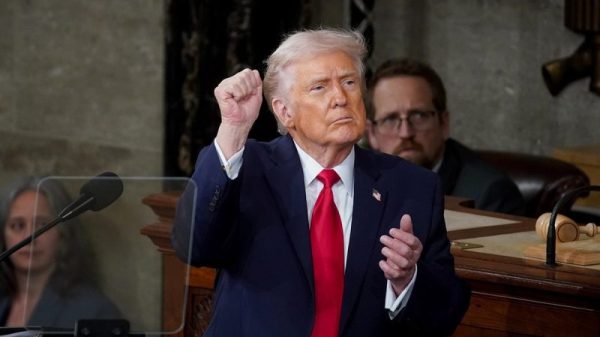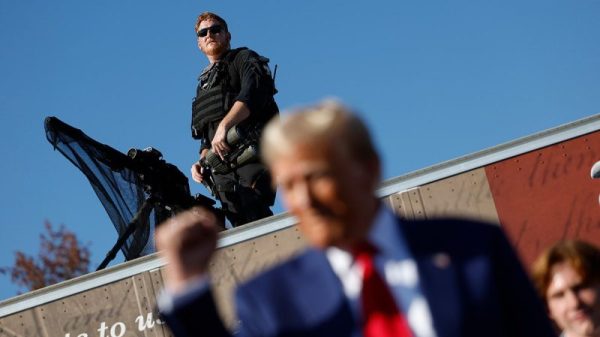NEWTON, Iowa — Former president Donald Trump suggested Saturday at a campaign event here that the U.S. Civil War “could have been negotiated,” a remark that drew criticism from historians as well as political opponents.
“The Civil War was so fascinating, so horrible,” Trump said. “So many mistakes were made. See, there was something I think could have been negotiated, to be honest with you. I think you could have negotiated that. All the people died, so many people died. You know, that was the disaster.”
Trump went on to describe the Civil War as “vicious” and suggested that “Abraham Lincoln, of course, if he negotiated it, you probably wouldn’t even know who Abraham Lincoln was.”
In interviews, historians described Trump’s statements as inaccurate and disputed the notion that a negotiation or compromise could have been reached to halt the war over slavery, which led to the deaths of an estimated 620,000 people between 1861 and 1865.
“Across much of the southern portion of the United States people were owned, bought, and sold by other humans. They were subject to whippings and other forms of inhumane discipline at the whims of those ‘owners,’” James Grossman, executive director of the American Historical Association, wrote in an email. “The declarations of secession explicitly state that the seceding states were leaving the Union to maintain that system, and because many northern states were refusing to return escapees from that regime. This could not be ‘negotiated.’”
Trump’s comments about the Civil War came before he repeated an often-made claim that his relationship with Russian President Vladimir Putin could have prevented the war in Ukraine.
It was the second time in less than two days that Trump has mentioned the Civil War at a campaign event in Iowa, where he remains the dominant polling leader ahead of the Jan. 15 caucuses. At back-to-back campaign events Friday in Sioux Center and Mason City, Trump criticized former U.N. ambassador Nikki Haley for not mentioning slavery at a recent campaign stop in New Hampshire, where she was asked about what the cause of the Civil War was. (Haley has since said that “of course the Civil War was about slavery.”)
“They asked her about the Civil War: Why did it start? How did it start? She didn’t use the word ‘slavery,’ which was interesting,” Trump told the crowd at an event in Mason City. “I don’t know that it’s going to have an impact, but I’d say slavery is sort of the obvious answer as opposed to about three paragraphs of bulls— she just talked. Nobody knew what she was saying.”
It’s also not the first time Trump has suggested that the Civil War’s outcome could have been different. In a 2017 radio interview, Trump said that if President Andrew Jackson had “been a little bit later, you wouldn’t have had the Civil War.” That remark drew criticism from historians, who noted that Jackson died 16 years before the Civil War began. Trump later tweeted “President Andrew Jackson, who died 16 years before the Civil War started, saw it coming and was angry. Would never have let it happen!”
Historians noted that, in the lead-up to the Civil War, there were efforts at compromise, including the 1820 Missouri Compromise, which established a geographical line where slavery was legal south of the line and illegal north of the line. It also brought Missouri into the union as a slave state and Maine into the union as a free state.
“White northerners were willing to compromise and accept that system existing in the South for a very long time,” Grossman said. “Basically the crux of the issue became unsolvable mainly relating to … the expansion of slavery but also what to do with fugitive slaves.”
David Blight, a history professor at Yale University, described Trump’s suggestion that the Civil War could have been negotiated as “elementary school nonsense” and “historically ignorant.”
“The Civil War is the most important and divisive event that ever happened to this country. It is of epic and terrible importance, and his kinds of comments just diminish it into a kind of political plaything,” he said. “It’s a diminishment of even the meaning of history itself. Why would we want to know any history if he can just say, ‘Oh you could have negotiated it.’?”
Historians were not the only ones to question Trump’s statement. Former House member Liz Cheney (R-Wyo.) posted on X: “Which part of the Civil War ‘could have been negotiated’? The slavery part? The secession part? Whether Lincoln should have preserved the Union? Question for members of the GOP — the party of Lincoln — who have endorsed Donald Trump: How can you possibly defend this?”
The Trump campaign did not provide additional clarification to questions about what a negotiation related to the Civil War would have looked like. Steven Cheung, a campaign spokesperson, however, shot back at the criticism.
“These ‘historians’ are nothing more than liberal, Democrat donors who are suffering with Trump Derangement Syndrome,” Cheung said in a statement. “The fact is that President Trump has done more to help move this country forward than any of these elitists who do nothing more than go on cable news and spew their hatred.”
He also described Cheney as “not a reputable source.” (During his speech Saturday in Newton, Trump also criticized Cheney for her work on the House committee that investigated the Jan. 6, 2021, attacks and took credit for her GOP primary loss last year.)
Blight responded that his comments about Trump had nothing to do with his political donations, adding “historical ignorance is still historical ignorance.” Meanwhile, Grossman emphasized that the American Historical Association is a “nonpartisan membership organization chartered by the United States Congress ‘for the promotion of historical studies.’”
NEWTON, Iowa — Former president Donald Trump suggested Saturday at a campaign event here that the U.S. Civil War “could have been negotiated,” a remark that drew criticism from historians as well as political opponents.
“The Civil War was so fascinating, so horrible,” Trump said. “So many mistakes were made. See, there was something I think could have been negotiated, to be honest with you. I think you could have negotiated that. All the people died, so many people died. You know, that was the disaster.”
Trump went on to describe the Civil War as “vicious” and suggested that “Abraham Lincoln, of course, if he negotiated it, you probably wouldn’t even know who Abraham Lincoln was.”
In interviews, historians described Trump’s statements as inaccurate and disputed the notion that a negotiation or compromise could have been reached to halt the war over slavery, which led to the deaths of an estimated 620,000 people between 1861 and 1865.
“Across much of the southern portion of the United States people were owned, bought, and sold by other humans. They were subject to whippings and other forms of inhumane discipline at the whims of those ‘owners,’” James Grossman, executive director of the American Historical Association, wrote in an email. “The declarations of secession explicitly state that the seceding states were leaving the Union to maintain that system, and because many northern states were refusing to return escapees from that regime. This could not be ‘negotiated.’”
Trump’s comments about the Civil War came before he repeated an often-made claim that his relationship with Russian President Vladimir Putin could have prevented the war in Ukraine.
It was the second time in less than two days that Trump has mentioned the Civil War at a campaign event in Iowa, where he remains the dominant polling leader ahead of the Jan. 15 caucuses. At back-to-back campaign events Friday in Sioux Center and Mason City, Trump criticized former U.N. ambassador Nikki Haley for not mentioning slavery at a recent campaign stop in New Hampshire, where she was asked about what the cause of the Civil War was. (Haley has since said that “of course the Civil War was about slavery.”)
“They asked her about the Civil War: Why did it start? How did it start? She didn’t use the word ‘slavery,’ which was interesting,” Trump told the crowd at an event in Mason City. “I don’t know that it’s going to have an impact, but I’d say slavery is sort of the obvious answer as opposed to about three paragraphs of bulls— she just talked. Nobody knew what she was saying.”
It’s also not the first time Trump has suggested that the Civil War’s outcome could have been different. In a 2017 radio interview, Trump said that if President Andrew Jackson had “been a little bit later, you wouldn’t have had the Civil War.” That remark drew criticism from historians, who noted that Jackson died 16 years before the Civil War began. Trump later tweeted “President Andrew Jackson, who died 16 years before the Civil War started, saw it coming and was angry. Would never have let it happen!”
Historians noted that, in the lead-up to the Civil War, there were efforts at compromise, including the 1820 Missouri Compromise, which established a geographical line where slavery was legal south of the line and illegal north of the line. It also brought Missouri into the union as a slave state and Maine into the union as a free state.
“White northerners were willing to compromise and accept that system existing in the South for a very long time,” Grossman said. “Basically the crux of the issue became unsolvable mainly relating to … the expansion of slavery but also what to do with fugitive slaves.”
David Blight, a history professor at Yale University, described Trump’s suggestion that the Civil War could have been negotiated as “elementary school nonsense” and “historically ignorant.”
“The Civil War is the most important and divisive event that ever happened to this country. It is of epic and terrible importance, and his kinds of comments just diminish it into a kind of political plaything,” he said. “It’s a diminishment of even the meaning of history itself. Why would we want to know any history if he can just say, ‘Oh you could have negotiated it.’?”
Historians were not the only ones to question Trump’s statement. Former House member Liz Cheney (R-Wyo.) posted on X: “Which part of the Civil War ‘could have been negotiated’? The slavery part? The secession part? Whether Lincoln should have preserved the Union? Question for members of the GOP — the party of Lincoln — who have endorsed Donald Trump: How can you possibly defend this?”
The Trump campaign did not provide additional clarification to questions about what a negotiation related to the Civil War would have looked like. Steven Cheung, a campaign spokesperson, however, shot back at the criticism.
“These ‘historians’ are nothing more than liberal, Democrat donors who are suffering with Trump Derangement Syndrome,” Cheung said in a statement. “The fact is that President Trump has done more to help move this country forward than any of these elitists who do nothing more than go on cable news and spew their hatred.”
He also described Cheney as “not a reputable source.” (During his speech Saturday in Newton, Trump also criticized Cheney for her work on the House committee that investigated the Jan. 6, 2021, attacks and took credit for her GOP primary loss last year.)
Blight responded that his comments about Trump had nothing to do with his political donations, adding “historical ignorance is still historical ignorance.” Meanwhile, Grossman emphasized that the American Historical Association is a “nonpartisan membership organization chartered by the United States Congress ‘for the promotion of historical studies.’”





















